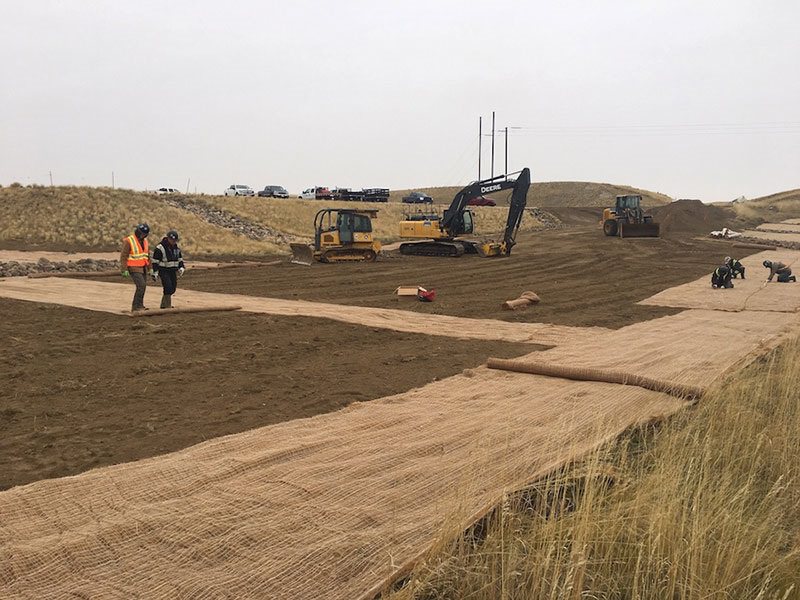December 2020, Vol. 247, No. 12
Projects
Projects December 2020
Centurion Group Awarded Keystone XL Contract
Alberta-based Centurion Group announced that its Site Resource Group (SRG) won a contract for work on the U.S. portion of TC Energy’s Keystone XL Pipeline.

Under the new contract, Centurion will maintain sections of Keystone XL right-of-way (ROW) in Montana, South Dakota and Nebraska.
The new contract involves reclamation and restoration of natural vegetation, hydrology and wildlife habitats. It also includes fencing, topsoil erosion protection, campsite and equipment laydown yard construction and vital COVID-19 disinfecting work, Centurion said.
Centurion-SRG started working with TC Energy on its Base Keystone System in 2010 and performed all the clearing and mulching on the ROW in 2019. After TC Energy announced in early 2020 that Keystone XL construction would proceed, Centurion began work on the 167-mile (269-km) pipeline in Alberta.
“SRG is working closely with the Province of Alberta and the Keystone XL Project team to protect rural communities, ecosystems and to create jobs,” the company said.
“It is a testament to SRG’s capabilities as a fully integrated services company that we have been contracted on a number of major projects,” SRG Senior Vice President Roger Didychuk said at the Keystone XL construction kick-off event on July 3.
Centurion provides services to the oil and gas, infrastructure, power, environmental and renewable energy sectors. In addition to North America, the company has a presence in Europe, Asia and Australia.
TC Energy Sees Higher Costs for Coastal Gaslink Pipeline
TC Energy expects costs for its Coastal Gaslink pipeline in British Columbia to rise due to increased scope, permit delays and effects of COVID-19.
The pipeline, which will deliver natural gas from Montney to LNG Canada’s liquefaction facility under construction near Kitimat, British Columbia, has faced opposition from environmentalists.
The construction of Coastal Gaslink was expected to cost more than $6.6 billion, and once the pipeline was in operation, an additional $42 million was forecast to be spent each year.
Separately, the company announced it will move ahead with its $200 million Wisconsin Access Project to increase natural gas capacity on a segment of its ANR Pipeline system, which transports fuel from various basins to the U.S. Midwest and Gulf Coast.
That project is expected to go online during the second half of 2022.
China’s Sinopec Completes Qingdao-Nanjing Gas Pipeline
China’s Sinopec completed construction of a natural gas pipeline connecting the Qingdao LNG terminal in Shandong province and Nanjing in Jiangsu province.
The 333-mile (536-km) pipeline, which also connects to the existing Sichuan-East gas pipeline, is designed to improve energy security in China’s eastern developed area, Sinopec said.
The Qingdao-Nanjing pipeline will be transferred to newly established PipeChina for operation, as part of the nation’s ongoing energy and state-owned enterprises reform.
Kinder Morgan Permian Highway Still on Track as Profit Falls
U.S. pipeline operator Kinder Morgan told investors its 2.1-Bcf/d Permian Highway pipeline remains on track to begin service in 2021 even as quarterly profit fell 10% due to lower shipping volumes.
The company blamed the drop in pipeline flows of refined products and natural gas on a fall in energy demand due to the coronavirus crisis.
Market conditions are weighing on a number of planned expansion projects, Kinder Morgan said, adding that they were not needed, at least in the near term.
CEO Steve Kean told Reuters the midstream segment stands to benefit from it as the industry would be left with stronger and well-capitalized players.
Fluor Awarded Pipeline Construction Contract in Peru
Fluor earned a pipeline construction and maintenance contract in Peru by Compañía Operadora de Gas (COGA) under the Consorcio Mantenimiento de Gasoductos del Peru (CMgP) consortium.
The five-year contract was awarded to Stork, an operations and maintenance arm of Fluor’s Diversified Services segment.
Stork will provide integral pipeline maintenance services to the Sistema De Transporte De Gas Natural y Líquidos de Gas Natural de Camisea, operated by COGA.
The consortium will jointly plan, prepare and deliver geotechnical, construction and maintenance services for more than 932 miles (1,500 km) of pipelines and for all relevant equipment and processing plants.
The pipelines connect Peru’s main gas field Camisea to the Peruvian coast.
‘“Stork is honored to be selected by COGA for this important contract,’“ said Taco de Haan, Stork’s president.
Premobilization activities of this contract have started with execution expected to begin in the first quarter of 2021 and completion scheduled in mid-2026.
Federal Judge Denies Bid to Halt Work on Keystone XL
A federal judge denied a request by Native American tribes to halt construction of the Keystone XL oil pipeline from Canada, based on concerns about possible leaks and treaty violations.
Work started this spring on the long-stalled pipeline that would carry oil sands crude from Hardisty, Alberta, to Steele City, Neb.
U.S. District Judge Brian Morris said the plaintiffs did not show they would suffer irreparable harm from the work that’s been done so far.
More than 1,000 people are working on the $9 billion project, which includes construction of 12 pump stations for the 1,200-mile (1,900-km) line, said Terry Cunha with TC Energy.
Israeli Pipeline Company Signs Deal to Bring UAE Oil to Europe
Israeli pipeline company EAPC (Europe Asia Pipeline Co.) signed a preliminary deal to transport oil from the United Arab Emirates to Europe via a pipeline that connects the Red Sea city of Eilat and the Mediterranean port of Ashkelon, Reuters said.
State-owned EAPC said it signed a binding memorandum of understanding with MED-RED Land Bridge, a company with Israeli and Emirati owners, in Abu Dhabi on Monday during a ceremony with visiting U.S. Treasury Secretary Steve Mnuchin.
The UAE exports the vast majority of its crude oil to Asia.
A source familiar with the deal said that, if finalized, it could be worth $700-$800 million over several years and that supplies could start at the beginning of 2021.
EAPC operates its eponymous pipeline and deals in oil storage and the export and import of distillates.
China Accelerates Pipeline, E&P Efforts
China said it would step up its exploration of oil and gas and speed up the construction of oil and gas pipelines and storage facilities, according to the official Xinhua News Agency.
It will also accelerate the construction of trunk oil and gas pipelines, the Communist Party said, reiterating its plans to dramatically increase the breadth of its pipeline transmission and distribution networks.
China, which has reported a significant recovery in energy demand after a period of harsh pandemic lockdowns, has been working to restructure its state-owned energy assets and develop natural gas infrastructure as it shifts from coal-fired electricity generation.
A year ago, China’s state-owned energy businesses underwent their biggest shuffle in two decades with the creation of a new centrally administered, state-owned pipeline company that combines all pipeline assets of the top three state-owned energy giants: China National Petroleum Corp., China Petrochemical Corp. and China National Offshore Oil Corp.
The change is designed to open access to China’s pipeline infrastructure to private and foreign energy producers to spur oil and gas exploration. The open pipeline network will allow companies to focus on exploration without any additional costs to move the fuel to market.
China is the world’s second-largest oil consumer and third-largest natural gas user, but its 82,600-mile (133,000-km) oil and gas pipeline network is less than one-fifth the size of the system in the United States, the world’s biggest oil and gas consumer.
Philippines Favors Gas, Shuts Door on Coal Power Proposals
The Philippines no longer accepts proposals for coal-based power projects in an effort to boost investment in natural gas and renewables, the government’s energy chief said.
Coal, however, will remain the dominant power source for years to come, and the coal-based projects and proposals already in progress will remain valid, Energy Secretary Alfonso Cusi told Reuters.
The increased approvals for coal-fired power plants in recent years has boosted coal’s position in the country’s power mix, accounting for 41% of capacity last year, when the country’s overall installed power capacity stood at 25,531 megawatts, Department of Energy data showed.
Renewable energy made up 29% of the mix, while natural gas took 13.5%. The rest was for oil-based fuel.
Azerbaijan to Proceed with Gas Pipeline Extension, Despite War
Azerbaijan will press ahead with plans to feed natural gas into an extended pipeline network to southern Europe, a senior official told Reuters, even as conflict rages for a sixth week in the enclave of Nagorno-Karabakh.
Elshad Nassirov, vice-president of Azeri national energy company SOCAR, said the $5 billion extension of the Southern Gas Corridor network would be ready this month to take up to 10 Bcm annually from the Shah Deniz field.
“In just two weeks, a new piece of infrastructure will be ready,” Nassirov said, referring to the Trans-Adriatic Pipeline.
Fighting in Nagorno-Karabakh, a mountain enclave internationally recognized as part of Azerbaijan but populated and controlled by ethnic Armenians, has raised concerns about the security of oil and gas pipelines in Azerbaijan.
BP, which leads the international consortium developing Shah Deniz, said last month it was looking to beef up security at its facilities in Azerbaijan after reports of attacks on the Baku-Tbilisi-Ceyhan oil pipeline.
India’s New GSPL Pipeline to Boost Gas Transmission Volumes
Gas transmission by India’s Gujarat State Petronet Ltd will rise by about a quarter in the next fiscal year starting from April as it links northern regions to an existing grid in the western state, a company official said.

The 578-mile (930-km) pipeline linking Mehsana in Gujarat to Bathinda in the northern state of Punjab at a cost of $739 million (55 billion rupees) will be ready by March, the firm’s joint managing director, Sanjeev Kumar, told Reuters.
“Around 80% of the physical work of the pipeline has been completed,” Kumar said in an interview.
India’s coronavirus lockdown hit construction of the pipeline, with a daily capacity of 30 million cubic meters (MMscm/d), delaying it past an initial completion date of December.
GSPL operates about 1,678 miles (2,700 km) of gas pipelines with capacity of 43 MMscm/d, but in the 2019-20 financial year it supplied 40 MMscm/d gas, as only one pipeline was commissioned in November 2019.
“The initial capacity utilization of the Mehsana-Bathinda pipeline will be 9 to 10 MMscm/d, which will be scaled up as new gas import terminals come up in the state,” Kumar added.
Two gas import terminals are expected to begin operations in Gujarat’s areas of Jaffrabad and Chhara in 2022.
India’s six existing terminals can handle 42.5 mtpa of gas imports, with about three-fourths of that capacity located in its west.





Comments